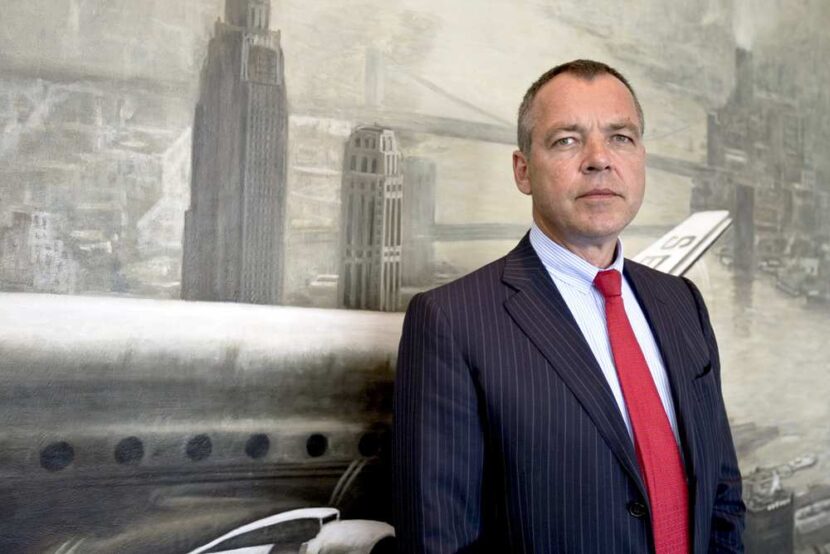KUALA LUMPUR — The chief executive of Malaysia Airlines said Wednesday that the carrier recorded a profit in February, its first positive monthly result in years, and is on track to return to the black by 2018.
In an interview with The Associated Press, CEO Christoph Mueller described the airline as a “ship that has many leaks,” but said the monthly profit was a sign that things are on the right track. He said revenue has improved and costs are down, underpinned by low jet fuel prices.
Twin disasters in 2014, including the disappearance of Flight 370 en route from Kuala Lumpur to Beijing, hurt the airline’s reputation. But Mueller said its main problems were an unsustainable network of routes, high operating costs and archaic information technology systems, among others.
“Our target is to break even by 2018,” said Mueller, a turnaround veteran hired a year ago under a $1.5 billion overhaul that included cutting 6,000 jobs and axing unprofitable routes.
“For a company that lost 2 billion ringgit ($511 million) just last year, if you are able to break even for a month or so, it means the financial gap between revenue and cost has significantly closed, and that is good news that tells us that we are on the right trajectory,” he said.
Even before the disasters, the national carrier was ailing from mismanagement that saddled it with at least $1.7 billion in losses since 2011.
It reeled further after Flight 370 vanished in March 2014 with 239 people on board and a second Boeing 777 carrying 298 people was shot down over Ukraine a few months later. The company was removed from Malaysia’s stock exchange the same year, with the government pumping in 6 billion ringgit ($1.5 billion) under a radical restructuring.
In December, Malaysia Airlines unveiled an alliance with Emirates that allows it to piggyback on at least 70 of the Gulf carrier’s global routes so it can focus on Asia. The only long-haul route it has kept is to London.
Mueller called the alliance a “win-win” situation. He said Malaysia Airlines isn’t shrinking, but instead has added many new destinations to its network through the Emirates partnership.
He said the company is focusing on Asia, the strongest market for international air travel, so that it can leave “strong footprints” in the region.
“The ambition of Malaysia Airlines is to grow again when we can afford growth,” he said. “If you grow as a loss making airline, you just increase the losses.”
Mueller said the airline’s fleet currently comprises 15 Airbus A330-300 planes, six superjumbo A380s and 54 Boeing 737-800s. He said four new A350-900 jets will be delivered in 2018, and that the airline will likely phase out its A380s at that time. The A380s are currently used for its London route.
The airline retired its 17 Boeing 777s after the 2014 disasters involving the aircraft. Asked if this was to remove the stigma associated with the tragedies, Mueller said it was because the 777s were the oldest planes in the airline’s fleet, averaging 16 1/2 years, and were the least fuel efficient.
Mueller acknowledged that it would be bad for Malaysia Airlines and the industry if Flight 370 remains a mystery.
“A forever missing aircraft is certainly a heavy burden for the industry as a whole,” he said.
An ongoing search in the southern Indian Ocean, where aviation experts believe the plane crashed after deviating from its original flight path, has found nothing so far. A wing part was found last year on Reunion Island in the western Indian Ocean. More plane debris was discovered recently in Mozambique and other parts of Africa and is being examined.
In rejuvenating the business, Mueller said the airline’s products are “tired” and don’t appeal to young travellers. The carrier has embraced changes including introducing a new business class with lie-flat beds, new menus and inflight Wi-Fi. It also plans to refurbish airport lounges.
To save costs, Mueller said he has reduced the number of suppliers from more than 20,000 to about 4,900. The target is to reduce the number to 2,000.
A year after taking over the job, Mueller said it has been hard work cutting through the corporate culture of a state-owned company where red tape was thick and employees had many “entitlements.”
He said he is fostering a more open working environment in which hierarchies and bureaucracy are being slowly removed.
Employers are encouraged to communicate more freely with each other and to work as a team, he said. While there is still some unhappiness among staff, he said morale is picking up.
“We have 220 projects. I cannot pick one and say this is the one that will save the airline. We have to repair in a lot of cases,” Mueller said. “My biggest problem is that the day has only 24 hours and the week has only seven days.”

